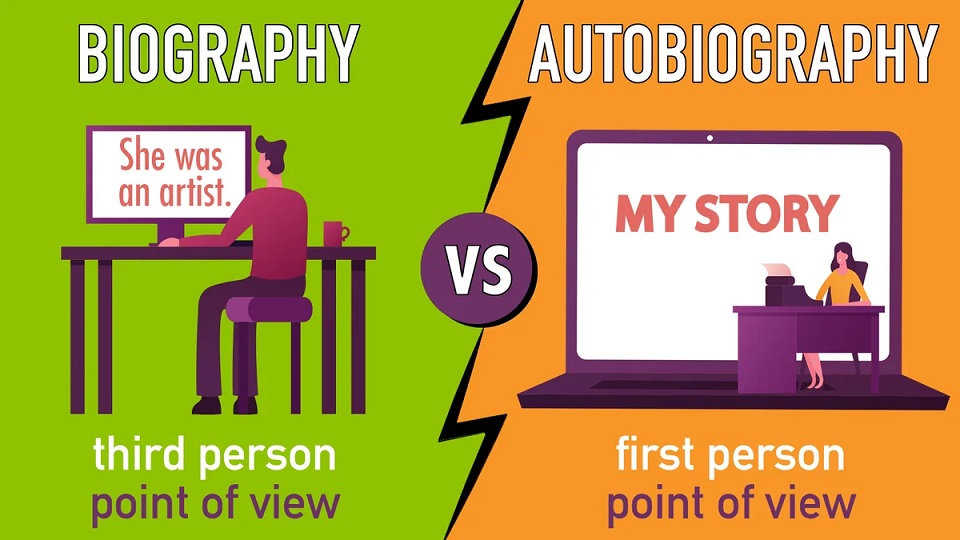
Introduction: biography vs autobiography
In the realm of literature, the terms biography and autobiography are often used interchangeably, yet they represent distinct genres with unique characteristics. Understanding these differences is essential for readers, writers, and historians alike. This comprehensive guide delves into the nuances of both forms, offering a detailed comparison that highlights their respective merits and uses for biography vs autobiography.
Defining Biography and Autobiography
Biography is a narrative detailing the life story of a person, written by someone else. It involves extensive research and often relies on various sources such as letters, diaries, interviews, and public records. The biographer aims to present a factual and balanced account, providing insights into the subject’s personality, achievements, and impact on society in biography vs autobiography.
Autobiography, on the other hand, is a self-written account of the author’s life. It is a personal reflection that offers a direct perspective from the individual experiencing the events. Autobiographies provide intimate insights and subjective interpretations, making them rich in personal anecdotes and emotional depth.
The Purpose and Intent
Biography
The primary purpose of a biography is to inform and educate readers about a person’s life and accomplishments. Biographers often choose subjects who have made significant contributions to their field or society. The intent is to preserve history, celebrate achievements, and sometimes to offer critical analysis of the subject’s life choices and legacy biography vs autobiography.
Autobiography
An autobiography serves as a platform for self-expression and introspection. Authors write autobiographies to share their life experiences, and lessons learned biography vs autobiography, and to leave a personal legacy. It is a way to control their narrative and present their story from their own viewpoint, often providing motivation or inspiration to readers for best biography vs autobiography.
Research and Authenticity
Biography
Biographers engage in meticulous research to ensure the authenticity and accuracy of their narratives. They gather information from multiple sources, cross-referencing facts to build a credible story. This process involves:
- Conducting interviews with people who knew the subject biography vs autobiography
- Examining archival materials
- Analyzing historical context and its influence on the subject’s life biography vs autobiography
Biographies strive for objectivity, although the biographer’s interpretation can introduce a subtle bias biography vs autobiography.
Autobiography
While autobiographies rely primarily on the author’s memory and personal documents, they may also incorporate external sources for verification. However, the subjective nature of autobiographies means they are inherently biased. The authenticity comes from the personal voice and firsthand accounts, offering a unique and intimate perspective that biographies might lack biography vs autobiography.
Narrative Style and Structure
Biography
Biographies are typically written in the third person, providing a detached and observational tone. The structure is often chronological, tracing the subject’s life from birth to death, or from significant milestones. Some biographies may focus on specific periods or aspects of the subject’s life, known as thematic biographies. Key elements include:
- Introduction to the subject’s background biography vs autobiography
- Detailed account of significant life events
- Analysis of the subject’s impact and legacy
Autobiography
Autobiographies are written in the first person, creating an immediate and personal connection with the reader. The narrative style is often reflective and conversational. While many autobiographies follow a chronological order, some may adopt a thematic approach, focusing on particular experiences or phases of life. Common elements include:
- Personal anecdotes and stories
- Emotional reflections and insights
- Direct communication with the reader
Impact on Readers
Biography
Biographies provide readers with an objective and comprehensive understanding of a person’s life. They can inspire, educate, and offer valuable historical insights. Readers gain a multifaceted view of the subject, understanding their achievements, challenges, and the context of their time’s biography vs autobiography.
Autobiography
Autobiographies offer a deeply personal and emotional experience. Readers gain access to the inner thoughts and feelings of the author’s biography vs autobiography, fostering empathy and connection. These works can be particularly inspiring, as they present real-life stories of overcoming adversity, personal growth, and triumph.
Famous Examples
Notable Biographies
- “The Life of Samuel Johnson” by James Boswell: Often considered one of the greatest biographies in the English language, Boswell’s work is noted for its detailed and vivid portrayal of Johnson.
- “Steve Jobs” by Walter Isaacson: This biography of the Apple co-founder offers an in-depth look at his life, innovations, and complex personality.
Renowned Autobiographies
- “The Diary of a Young Girl” by Anne Frank: An enduring work that provides a poignant and powerful perspective on the horrors of the Holocaust through the eyes of a young girl.
- “Long Walk to Freedom” by Nelson Mandela: This autobiography chronicles Mandela’s journey from his early years, through his 27 years in prison, to his presidency and efforts to dismantle apartheid in South Africa.
Choosing Between a Biography and an Autobiography
When deciding between writing a biography or an autobiography, consider the following factors:
- Perspective: Do you want an external, objective view or a personal, subjective account?
- Purpose: Are you aiming to inform and educate, or to share personal experiences and reflections?
- Scope: Will the work cover the entire life or focus on specific periods or themes?
Conclusion
Both biographies and autobiographies play crucial roles in literature and history, offering unique insights and perspectives on individuals’ lives. While biographies provide a researched, balanced view, autobiographies offer personal, firsthand narratives. Understanding the distinctions between these two forms enriches our appreciation of both genres and enhances our ability to choose the right approach for our storytelling needs.

